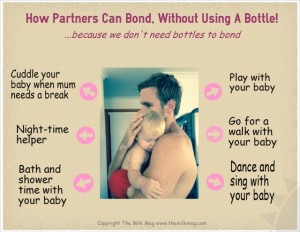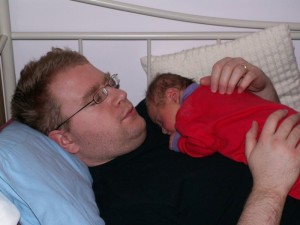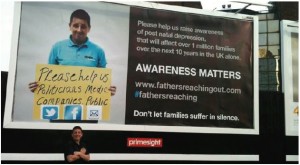There have been some fantastic conversations taking place on the MatExp Facebook group, with lots of ACTION threads being posted to generate discussion. The aim of these discussions is to identify ways that we can ACT to improve maternity experiences. Big, long-term actions that might require system change or a change in culture. And small, immediate actions, that professionals and individuals can take today to improve the maternity experience of those around them.
A topic that I brought up in the early days of the group was Dads & Partners. How can we support them? How can they support us? How can they be involved in maternity experience? What do they struggle with?
From the group discussion, and discussions I have had elsewhere, there are three key themes when it comes to Dads & Partners:
- Including them in the maternity experience
- Allowing them to stay with their new family
- Supporting them with their own mental health & the mental health of their loved ones
It Takes Two
Including Dads & Partners in the maternity experience is helpful for all concerned. It helps them to understand what is going to happen to the woman in their life, to prepare themselves for the different scenarios of birth and the postnatal period. It empowers them to help the mother and brings them together as a unit, which is of huge benefit to the baby. Informing and supporting Dads & Partners is a gift to a new family – Mark Harris of Birthing for Blokes explained at the ABM Conference last week that a well informed and prepared partner is a consistent presence for the mother, helping her every day where healthcare professionals might only be available briefly and inconsistently.
Mark also explained how men are generally “goal orientated” creatures who like to understand their role and the expectations that go with it. Giving a man clear guidance as to how he can support the new mother in his life can be so helpful to the whole family. From a breastfeeding perspective, for example, there are so many things that a Dad or Partner can do to truly support a breastfeeding mother, as a great blog by The Milk Meg explains.
ACTION: healthcare professionals, please make sure that you find out who mum’s “cheerleaders” are going to be in pregnancy and in motherhood. This might not be a father or a partner, it could be a grandparent or a friend, but whoever it is needs to be informed and empowered for their own benefit and the benefit of the mother & baby they care about.
ACTION: parents and families, be sure to speak up if you feel that not every member of the family team is being adequately supported on your maternity journey.
Stay With Me
Allowing Dads and Partners to stay with their new family in hospital once the baby is born is something that I see suggested over and over again as a key issue for parents. NICU nurse Louise has written this blog post on the subject and I used it as an opener to the thread on the #MatExp group. This comment from a group member demonstrated the way that dads can feel uninvolved:
“My husband really struggled after our first son was born. He felt ignored, pushed aside and unimportant whilst I was in labour, no one would tell him anything when I was being prepped in theatre and half an hour after my son was born he was thrown out, not allowed to walk me to the ward or have any time with us. It was better on the ward, they were more relaxed but obviously he still had to leave. When I got pregnant again it became obvious he has some major birth trauma to work through as well” (#MatExp Facebook group member)
When talking about partners being asked to leave once the baby was born, group members described this as “shocking”, “barbaric”, “being torn away from your support system” and overwhelming feelings of loneliness and being alone when “confused, dizzy, bleeding, trying to read breastfeeding leaflets and change meconium-filled nappies in the dark.” The discussion was an emotional one, with many women feeling outrage that one half of their family and parenting team was ousted from the crucial first hours of the family and parenting experience.
I asked Mark Williams of Fathers Reaching Out for his thoughts on this:
“In my own experience it would have been easier for my wife after a twenty hour labour and an emergency C-Section for me to help her with my son. My wife hadn’t slept and was totally exhausted and coming down off medication so needed support, which I would have been able to give her.”
From my own personal perspective, choosing a homebirth with my first baby was due in large part to my utter terror at the idea of being left alone in hospital with a new baby without the one person who understands me, understands my anxieties, cares about my wellbeing and knows how to support me. This is Phil with Edward the morning after our son was born. Overnight he had helped me to feed him, changed his nappy, settled him and by the morning we both knew as much about our new son as each other. Why should any father be denied that?
ACTION: the goal of keeping families together to be at the forefront of maternity unit design.
ACTION: if your maternity unit does ask Dads & Partners to leave, please ensure that marketing reps are not allowed onto the unit at times when family members are not. This is grossly unjust.
Overlooked
Just as women can be traumatised by the birth experience, suffer postnatally with depression and anxiety and feel overwhelmed by the responsibilities of parenthood, so can Dads & Partners. Yet it was discussed on the group that men often don’t feel “allowed” to be traumatised or to be struggling. There are connections here to other themes, as feeling disempowered at the birth can lead to problems later on for the partner.
Mark Williams campaigns for recognition of the needs of Dads & Partners when it comes to perinatal mental health. This post on Stigma Fighters explains some of his journey. This Fathers’ Day Mark is launching Dads Matter UK and is asking for the health service to “develop a process for the screening and detecting of PND in fathers.” To read more about this campaign please have a look at this item from the Huffington Post.
Mark described to me what his own experiences have taught him about the needs of Dads & Partners:
“I feel dads need to know what is going on in order to help deal with their own anxiety – help from doulas could be a way forward. If you have a well dad or partner, you have a better chance the mother will be supported by them. Many fathers or partners I talk to just feel useless when dealing with the mother’s mental health, and sometimes that feeling of helplessness has an impact on them. Many dads isolate their true feelings so as not to upset the mother, or make matters worse. They only want the mother of their child to be well and gain a full recovery.”
ACTION: Follow @MarkWilliamsROW on Twitter and find out how you can join his campaigns.
ACTION: Recognise that Dads & Partners can suffer from perinatal mental illnesses too.
With best wishes to all the Dads & Partners out there, and to all those who are supporting mothers and caring for new babies.





[…] Source: Time to Act for Dads & Partners | Maternity Experience […]